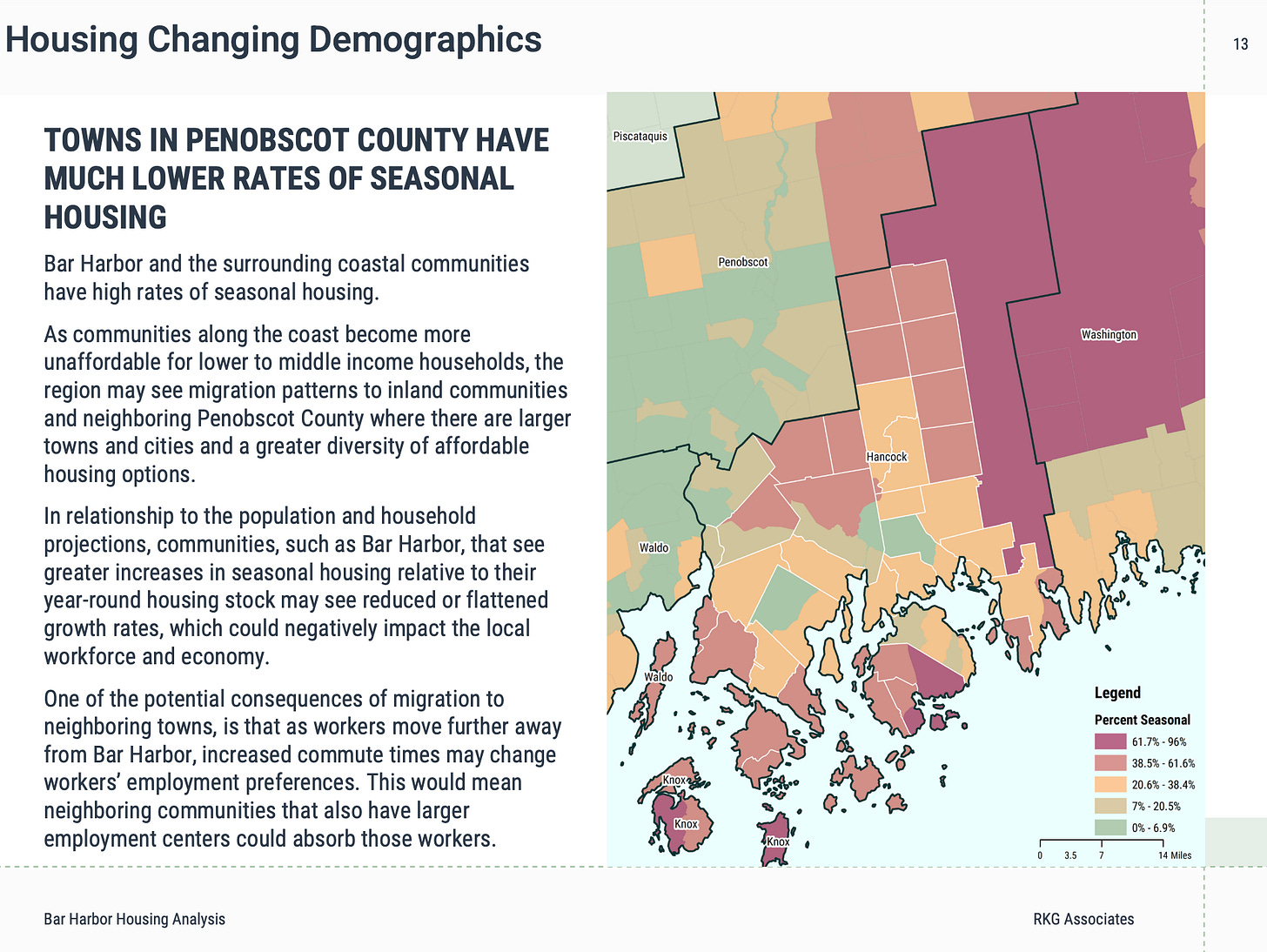Where Will All The Workers Go?
With housing stock becoming seasonally focused or short-term rentals, town administrators worry that their towns will be lost
TRENTON—”Sobering.”
“Sad.”
“Worrisome.”
Several town managers expressed concern about the fate of their towns due to what they feel is a lack of homes for people who work in their communities year round.
It’s time to meet about it, they said, and try to get something positive happening.
Members of the League of Towns are planning a meeting in October to focus on housing. That meeting would include the select boards from the towns, too, and likely include 30-40 people. Some problems require a regional approach and a lot of diverse thoughts to solve. This is something that both Bar Harbor Town Planner Michele Gagnon and Noel Musson of the Musson Group have been saying publicly for years.
Administrators are thinking that way, too.
“The rents in Trenton start at $1,600 a month. I think that’s outrageous,” Trenton Administrator and Municipal Clerk Carol Reed Walsh said Tuesday during a League of Towns meeting.
Affordable housing and especially low-income housing, Walsh said, doesn’t have incomes that start at $75,000. It’s much less.
“What can these poor people do?” Walsh said.
“The problem is multi-faceted,” Mount Desert Town Manager Durlin Lunt said from across the table at the Trenton Town Office.
Lunt said that the population of Mount Desert has hollowed out so much that if the nonprofit group Mount Desert 365’s project of six apartments on Heel Way and a potential fifteen more above buildings on Main Street go through, it would “make a significant difference.”
The 2020 census said the population of Mount Desert is 2,146. According to a report in late December 2022 issued by the Bar Harbor Comprehensive Planning Committee, population increases can be constrained by limited space able to be developed, costs of living and the costs to build.
Mount Desert’s Heel Way subdivision was originally thought of as $250k purchase price for the units. Lunt worried that ongoing litigation would make that price rise.
“The longer this goes, will they be able to hit that price point?” Lunt wondered of the case, which the town won, but has now been appealed. “Not only do we need more workforce housing, but now we’re finding it more difficult to get it sited.”
Walsh said that there are multiple factors involved with housing and pointed to non-profits purchasing apartment buildings and converting them to designated seasonal worker housing as well as short-term rentals. Increasing supply costs and land-use rules and lawsuits which were discussed by Lunt.
Costs to build homes, costs of supplies for contractors, lack of buildable lots, lack of workers to build those homes, aging housing stock are also factors not often mentioned.
Currently, there are three organizations who are leading the way in the creation of affordable homes: Island Housing Trust (IHT), Mount Desert 365 (MD365), and MDI Housing Solutions Initiative, which is a collaboration between the Musson Group and IHT. In the last two years, there were two forums regarding housing issues on MDI.
Tremont Town Manager Jesse Dunbar said he’s heard more people complaining about the conversion of year-round housing to seasonal housing by nonprofits. He wondered if there was a way to require year-round housing being built for every application for seasonal homes.
There are other aspects involved as well. Lunt spoke of safety-valve communities, away from more expensive towns, where homes were affordable and people commuted into those other communities to work. Now, he said, those safety-valve communities are not safety valves, but expensive as well.
“Housing costs are high across the board, but renting is a more affordable and realistic option for many Americans right now — especially those who have never owned a home and aren’t able to tap into equity from a previous sale,” Redfin chief economist Daryl Fairweather told MSN’s Dennis Romboy.
He added, “While owning a home is usually a sound long-term investment, the barriers to entry and upfront costs of buying are higher than renting. Buying typically requires a sizable down payment and approval for a mortgage—things that are difficult for many people today, when the typical down payment is near $60,000 and mortgage payments are sky-high. The sheer expense of purchasing a home is causing the American Dream of homeownership to lose some of its shine.”
The longer distance people needing to commute to Trenton and Mount Desert Island leads into transportation issues when there is just one way on and off Mount Desert Island.
“You’ve got more people on the road, year round,” Walsh said.

“The only way to make housing affordable is to go back to the USDA,” Trenton Select Board Chair R. Frederick Ehrlenbach said.
The USDA federal programs have evolved throughout the last century or so, but currently there are Single Family Housing Direct Home Loans (also called Section 502) that, according to the USDA website, “assists low- and very-low-income applicants obtain decent, safe and sanitary housing in eligible rural areas by providing payment assistance to increase an applicant’s repayment ability.”
A Redfin analysis earlier this year showed that “first-time homebuyers must make roughly $76,000 a year to afford a typical starter home, up 8% from a year ago and almost 100% from before the COVID-19 pandemic,” Romboy writes. “Home prices have shot up more than 40% since 2019, due to the pandemic home buying frenzy and a shortage of houses for sale. While the current average 30-year fixed mortgage of 6.82% is less than the 23-year high of nearly 8% last October, it’s still more than double the record low rates in 2020.”
There are currently 66 homes for sale on Mount Desert Island according to the real estate site Zillow. The lowest priced home is $265,000 for a two-bedroom in Bar Harbor. Only three homes are under $479,000. There are four homes for sale in Trenton, according to the same site. Those start at $500,000.
Walsh said that one six-unit apartment unit on Route 3 is being turned into seasonal rentals. Six units on Route 204 are being changed from condominium to townhomes for seasonal Island Explorer workers. The free bus service has had staffing shortages that have been blamed on housing. The purchase was made by Friends of Acadia. The group has also purchased 17 acres that are adjacent to the site.
The Jordan River Road project being turned into seasonal housing for nonprofit workers also requires the current residents to leave. Some have to travel to Bangor to find a place to live, Walsh said.
Tremont is losing 14 two-bedroom apartments to short-term-rental use, Town Manager Jesse Dunbar said.
Acadia Villas in Trenton was once apartments. Now it’s seasonal housing, Ehrlenbach said. That’s about 36 units, he said.
“How do you have a community?” Lunt asked. A community needs people to run its schools, people to provide services, to fight fires, to be town managers, to be law enforcement officers. “How do we survive?”
A lot of ski towns in other states have dealt with this, Lunt said.
In Jackson Hole, Wyoming, the gentrification of the tourist town is decried as a main reason that the town’s workers have been priced out and commute 45 minutes or more. The average price for a home there is more than $7 million. Like many communities on Mount Desert Island, much of the land is either federally protected or owned and cannot be developed for homes. The costs of homes has “grown at double the rate of the increase in wages there” according to a Wall Street Journal piece by Nancy Keates.
A recent article on MSN posted about one town in Colorado that can’t fill a $157,000 a year job because candidates can’t live there.
“At the Steamboat hospital, doctors willing to pay more than $1 million for a home have been repeatedly outbid by all-cash, out-of-town buyers, and housing costs have caused some positions to go unfilled for more than two years. The local ski resort has been leasing a hotel for its employees to live in as the homes they once rented are increasingly turned into short-term rentals for visitors,” they wrote.
Those are potential futures that worried many attending the Tuesday meeting.
“Those towns, they’re gone. That can happen to us. That’s sobering,” Lunt said.
The town administrators from Mount Desert, Tremont, Trenton, and Southwest Harbor, along with Ehrlenbach and John Kelley from Acadia National Park met in the Trenton Town Office and via Zoom. The housing discussion began as the group updated its list of work topics to focus on in the upcoming year. That list included municipal collaboration and transportation. All of which are linked, Lunt said.
The current work list of topics is from 2019.
LINKS TO LEARN MORE
MDI HOUSING SOLUTIONS INITIATIVE
Can a Town Pass the Halloween Test?
If you’d like to donate to help support us, you can, but no pressure! Just click here.






There needs to be legislation restricting Air BnB on the island.
Friends of Acadia have almost raised 10 million dollars which I understand will unlock another 10 million dollars. Now that is 20 million (+) that will build housing for 60 Acadia NP employees. Now I don't know if anyone thinks that is reasonable BUT.... That comes out to almost 334,000. per bed.